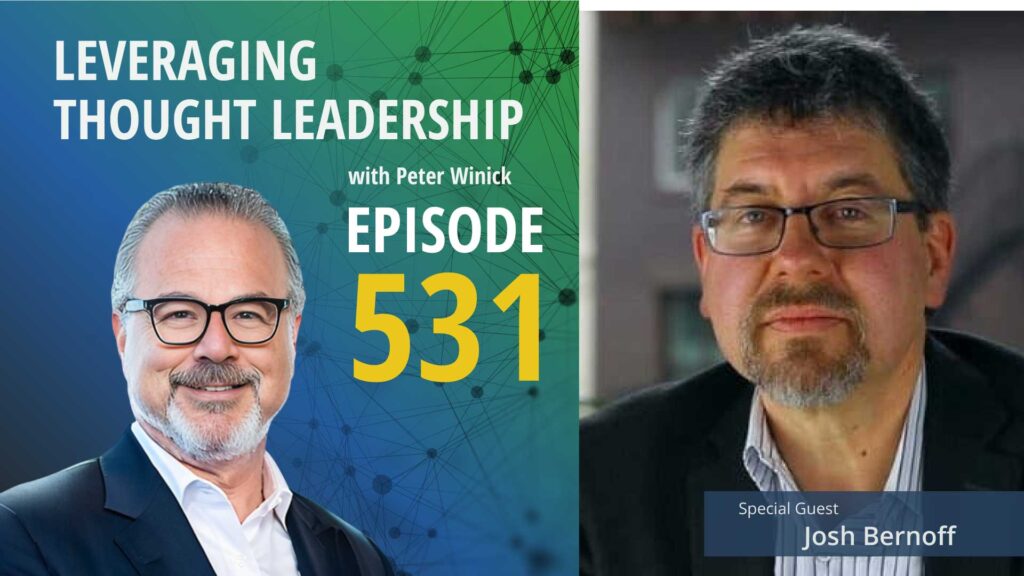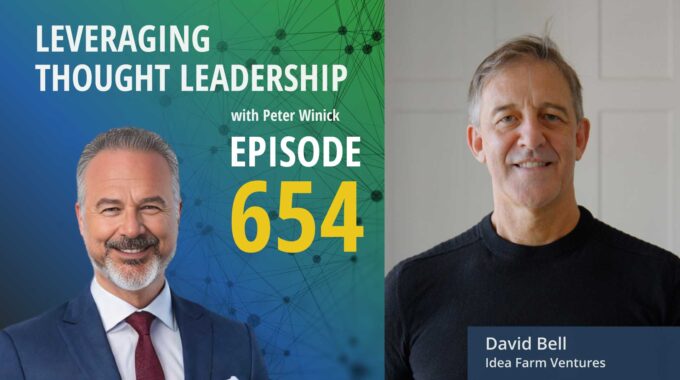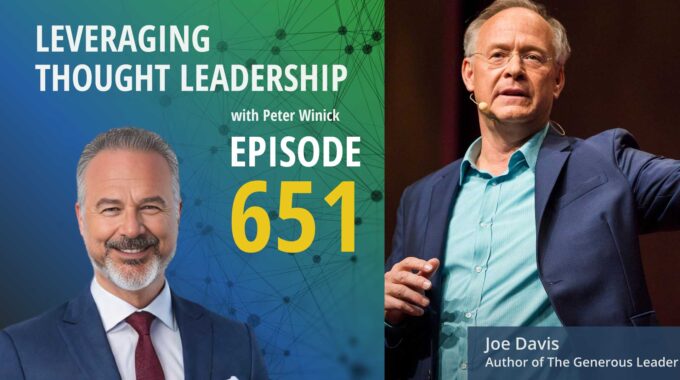Turning frameworks into funding: The hard truth about scaling thought leadership. This episode explores how…
Writing a Better Business Book | Josh Bernoff

Tips for planning, writing, and promoting a business book.
An interview with Josh Bernoff about getting your book on the shelf and discovering what success means to you.
A lot of thought leaders have authored books, eager to get their insights out into the world.
Yet many start the task without having a well-defined plan for what comes next!
Our guest today has literally written the book on writing thought leadership books! “Build a Better Business Book: How to Plan, Write and Promote a Book That Matters” is the work of the amazing Josh Bernoff, and we can’t think of a better person to help nonfiction authors succeed.
In order to help authors find success, they first must understand what that means to them. Josh explains how success can look differently to each author and often is unrelated to the quantity of books sold. Success can take the form of launching a speaking career, generating leads, or purely having a book that makes you the authority in your field.
Once you know what sort of success you want, you’ll need to plan beyond the book. Josh shares how many authors don’t look beyond the launch of their book and become disappointed when nothing happens. However, those that properly promote their book, and have scalable plans in place for after the book is launched, can take their business to the next level.
If you have an idea for a book, but you’re not sure if it checks the boxes of “big, right, and new,” then this episode will guide you on your journey.
Three Key Takeaways:
- For authors, the success of a book is typically not measured in sales but in the additional business generated from the book.
- Before you publish a book have a plan to define yourself beyond the book.
- Tradition, hybrid, and self-publishing all have pros and cons. You must understand the needs of your book to find the right fit.
If you need a strategy to bring your thought leadership to market, Thought Leadership Leverage can assist you! Contact us for more information. In addition, we can help you implement marketing, research, and sales. Let us help you so you can devote yourself to what you do best.

Transcript
Peter Winick And welcome, welcome, welcome. This is Peter Winick. I’m the founder and CEO at Thought Leadership Leverage and you’re joining us on the podcast today, which is leveraging thought leadership today. My guest is Josh Bernoff, and I’ll give you a little bit of a bio on Josh, but my favorite piece so far is on his LinkedIn bio. Just as I help nonfiction authors succeed, that’s pretty clear. Some of the other highlights from his career. His most recent book, published by Amplify, is called Build a Better Business Book How to Plan, Write and Promote a Book That Matters. Previous book that he did in 2016 was Writing Without Bullshit. Boost your career by saying what you mean. He’s been around this whole nonfiction world, and given that that is the space that our listeners spend their time. And I thought today would be an interesting conversation. So welcome, Josh, thanks for coming out.
Josh Bernoff Thank you.
Peter Winick So much. So let’s start with the nonfiction business book. Space is not an easy space. So when you say you help authors succeed, you know my and maybe it’s because I’ve been a consultant for too long. Well, what is success mean?
Josh Bernoff Success is varies depending on what the author is trying to accomplish. I actually surveyed authors for my book, and the number one thing that they said they wanted to do was to share the knowledge that they had. So in some broad sense, success to them just means that people know the stuff that they want them to know. But of course, we all need to make a living. And in general, success is not measured in the number of books sold, but in accomplishing other goals getting a speaking career, generating leads, running workshops. Perfect example is my own book. You know, the sales are not lighting the world on fire, but a significant number of people have come to me and said, you know, I’d like you to do a $70,000 ghostwriting project or, you know, you really need to help me get by.
Peter Winick So stay there for me. Let’s use you as an example, because I love it. So the number of people picking up a book called Build a Better Business Book, right? I’m going to imagine it’s pretty small, right? Because it’s a niche of people thinking about writing a business book. So in any moment in time, even though the book space is kind of exploding in terms of who’s writing. This is not a general leadership book. There’s not a general management book you’re not going to see in an airport, etc.. However, to your point, the probability of those people reading your book and go, Wow, this guy’s pretty smart, he’s got some really great ideas, and here I want to reach out and talk to him. Right. And you don’t need a lot of those high five figure transactions to be a happy camper, right?
Josh Bernoff Yeah. It was literally the case with this most recent ghostwriting project. It was a bake off between five writers have been narrowed down from dozens. And they said, Well, you wrote the book on this, so you’re the guy. And that in general is what people can accomplish with a business book is that they become known as the expert in customer experience or the expert in leadership for financial services companies or whatever. And that makes them the go to person, and that’s what the book accomplishes for them.
Peter Winick Right now, in your case, the product, the offering is you, right? They can hire you to be a collaborator on a book, ghostwriter or book, which is great. And you’ve got the credentials for other people they actually really need to think through. Okay, so this is my expertise and it lives in the book. What are the other formats and modalities that that thought leadership can live in and how do I sign the appropriate value meaning price to each of those? Right. Because a book, 20, $30, whatever. But it’s. Speak to that for a moment.
Josh Bernoff Yeah. You know, that’s interesting because it takes a real balance. I have worked with people who are like, you know, I just need to get this book out. And then the book gets published and they’re like, I thought something good was supposed to happen. I’m like, Well, you did well. You didn’t plan for anything good to happen. And as a result, it doesn’t necessarily pay off for you. And then the other end of the spectrum is this book is a brochure for my consulting business. And the problem with that is nobody wants to read a brochure for your consulting business. A book has to stand on its own as being full of valuable and useful insight. And then, just like any other form of content marketing, people are like, All right, maybe I want to work with this guy. So you need to think, are you are you a public speaker? Are you still, you know, doing workshops? I have worked with people who are like CEOs of AI companies. And their goal is just to get credibility in their space.
Peter Winick Which is not.
Josh Bernoff What you want. Yeah. Oh, yeah, sure. But you have to know ahead of time what it is that you hope you will accomplish.
Peter Winick Got it. So. I want to move and then we’ll come back to the content for a minute and talk about sort of the landscape of the publishing world right now. Right. In terms of traditional nontraditional vanity press, etc., and how to make the right decision for you because there is no one size fits all. Yeah.
Josh Bernoff No, I this is this is something I counsel authors on all the time. Everybody starts with this idea that has come down from time immemorial that you want to get published by a name publisher. You want to work with a traditional publisher, you pitch them and then they pay you an advance, which is very nice to get paid to write a book. And the challenge with that is a couple of things. One is you have to write an extensive proposal to convince them that you have what it takes to write this book and to market it. And the second is just time, because traditional publishers, even if you manage to get one interested, typically takes a year and a half to get a book out. And for a lot of people who have a goal, you know, a year and a half from now is too late for them to get their ideas out. If you want to sort of jump the line, then you can work with a hybrid publisher. So a hybrid publisher is basically the same as traditional publisher, but you pay them. Now, you mention the words vanity press. That’s sort of an old fashioned idea. There are a lot of the most successful books that I’ve worked with people on, or through hybrid publishers. Examples are Amplify Greenleaf books wonder Well, idiot press all really solid names out there. Page two. And as a result of that, you can get your book out much sooner, typically more like 6 to 8 months, as opposed to a year and a half. But you’re probably going to be out somewhere between 30 and $50,000.
Peter Winick You could make goals. Are there’s a speed variable. Yeah, the market there’s a control variable. Yeah, right. Yeah. And then there’s a but I would argue quality is probably not even a variable anymore.
Josh Bernoff Now, well, now I do want to talk about this because the third way to get the book out is to self-publish. And there are people who will help you do that. But that’s where quality comes into play because people look at it and say, Oh, you know, this book doesn’t look really professional. So yeah, I mean, the hybrid published books and the traditionally published books, you cannot tell one from the other in terms of quality. But once you go and try and do it yourself, you go very fast. It’s very cheap and it looks fast and cheap.
Peter Winick And it looks it right. Well, but the other piece where I was going to go is I don’t think a lot of people really think this through well enough. There’s an economic model. So, number one, even the concept of getting an advance for 99% of first time authors doesn’t exist. Right. And now we’re seeing what I call the worst of both worlds, where you go to a, quote, traditional publisher and they say, hey, that’s cool. You know, after you’ve gone through the select criteria, you read the proposal, etc., you have to guarantee them that you’re going to buy X number of books at wholesale per year, per number of years. So you’re now burdened with the economic.
Josh Bernoff Now, the only organization I know that does what you said is Wylie, but Wylie publishes a very significant share of the business books out there, and I think that’s why people have that idea of the very aggressive at finding people. And then when they find them, they’re like, Yeah, well, you need to guarantee sales of ten, 10 to 20000 books. The you know, that the there are a lot of ways to get your work in in print here is as I’ve described and you have to balance between speed and cost and quality and the level of reputation that you’re trying to accomplish. Oh, it’s interesting. In my book, I talk about Phil M Jones, who wrote a book on sales called Exactly What to Say, and he started as a self-published author. And then it became vastly successful. And as a result, he got lots of money from that and parlayed that into the ability to work with the more traditional publishers. After that.
Peter Winick If you’re enjoying this episode of Leveraging Thought. Leadership, please make sure to subscribe. If you’d like to help spread the word about our podcast, please leave a five-star review at ratethispodcast com/ltl and share it with your friends. We’re available on Apple Podcasts and on all major listening apps as well as at ThoughtLeadershipLeverage.com/podcast.
Peter Winick I want to get your thoughts because I struggle with certain client at times sort of having some of these conversations where what I would define as the book industrial complex, right? Publicists, publishers, etc., etc. they always I shouldn’t say always, more often than not, think about a book. As a seasonal release. That’s a fall release. That’s a spring release in all its energy and effort goes into this three, four or five month, something like that period to get on a podcast and do this and launch the book like it’s a movie opening. And I always say to my clients, like, Wait a minute, hold on a second. It’s great to start with a push, but you need to think about your book and no pun intended in ways that think that you have a 5-to-7-year shelf life, right? Especially a book like yours is an evergreen book. Whether I pick that up today or in a year from now or in three years from now, the right person picking up your book at the right time for them is when supply and demand and how would you react to that?
Josh Bernoff Well, the longest chapter in my book is on promotion, because that’s the most complicated thing that people need to do. And one of the principles is that you want to basically focus as much of your effort as possible in about a month before the book is out and two months afterwards. And that that sort of frenzy, you have to plan for that and then then just knock it out of the park. But that’s basically getting the vehicle moving. And yes, if you do that and then ignore it or leave it alone, then it’s a huge waste. It has to continue. And just like any other thought leadership activity, you’re continually out there giving speeches, writing, doing bylined articles. You know, appearing on podcasts and generally keeping the thing as relevant as possible. Especially there’s this concept that David Berman Scott invented called News jacking. Yeah. If something happens in your space and you’re like, I have a unique perspective on it, this is the time when you need to tell people about that. And if that happens to be seven months after your book came out, you can’t be off doing something else. You need to be visible.
Peter Winick Right? And, you know, oftentimes the sale of the book is better year two than year one because it starts to get out into the community, starts to get out into the marketplace, people start talking about it. So my point was this concerted sort of condensed effort is not that it’s bad per se, but it’s just one phase of an integrated marketing approach and you can’t just turn it on, switch on and turn it off and say, Well, I did the marketing of the book. Now if you fill up a book that’s in print, you should always be thinking about what am I doing to market the book, whether it’s five days old, five years old or 50 years old.
Josh Bernoff Well, given the kind of people you help, how many of them do you give the advice? Okay, you can relax. It’s time to stop promoting yourself. That’s bad advice. No matter whether you’re writing a book or not. It is a continual process. And while the book is a big lump of publicity or visibility or content in there, it’s just one point along the way.
Peter Winick So let me ask you this then. So if I were someone writing a business book and obviously I’m going to do it the right way because I bought your book and I learned from it. Yeah. If I were interviewing, let’s say, a PR firm or a book launch firm. If I were, what would you counsel me to ask of those organizations before I can make an informed buying decision?
Josh Bernoff I’d say the crucial, most crucial thing is to get recommendations from people that they’ve already worked with. And I would prefer going with someone who my friend and author was successful with over somebody else who has a huge reputation because it’s when you’re down in the trenches, you want somebody who you, the people you know, have recommended.
Peter Winick But when you say your friend. Mm positive. But when you say you’re an author. So I have lots of friends that are authors that are multiple New York Times bestsellers. And if I were to write a book tomorrow, I wouldn’t dare compare myself to them right now.
Josh Bernoff Now? Well, you want somebody like you. So if you have, you know, a content marketing book, you want to talk to somebody who’s got a publicist for a content marketing book. And if you have a memoir, you want to talk to somebody who’s been a publicist for a memoir. These companies have strengths. It’s mostly based on their connections. Can they get you on podcast? Can they get you reviewed and in well-known publications? And they’re insanely expensive, but results are what matter. And, you know, it’s what I find is that yeah, you can cheap out on these things, but you’ll get less impact and you really do not want rookies on this. I have seen this go so wrong where it’s like, Oh I know I had to do this because I, you know, a friend of mine did it and then then it’s like, oh, gee, nothing happened. And now about a whole bunch of money for nothing.
Peter Winick Right, right. Yeah. So give us a couple of things. If I was at the stage where I was thinking about maybe I do want to write a business book. Yeah, thinking about it. Right. What are the things that I should be thinking about? Questions I should be asking, expectations I should be setting of myself and of the project.
Josh Bernoff Well, it starts with an idea, and I have three criteria for the ideas that people need to use. They have to be big, right? And new. Big means that you have a specific audience and you’re really going to help them. Right. Is you can actually prove what you’re saying. So you have data or case studies or something, some sort of evidence. But of those things, new is the most important because nobody wants to read the 12th book on leadership. You know what? What is your unique take on leadership that nobody’s ever heard before? What is the thing that differentiates your perspective? And if you don’t have all three of those things that you’re not really ready to start about?
Peter Winick But just on the new piece, I think that people. Don’t understand that new doesn’t need to be a brand new space. New could be a dip. So let’s take leadership, for example. Right. The world is not in the leadership, but the world has needed in the last couple of years leadership books that talk about how do you lead in a world that is primarily hybrid? Yeah.
Josh Bernoff So yes. So yeah, you need a new spin on this. This is the first you want to say. This is the first book about investing that has a specific analysis of what to do in a high inflation environment. Okay. I want to read that right now. Yes, it’s the first book. I mean, really great example. Here is Melanie Diesel’s book, The Content Fuel Framework, which is a book on content marketing. You’re like, Oh, God, another content marketing book. And yet she has this ten by ten matrix, which you can use to generate an infinite number of content marketing ideas. I’m like, I haven’t seen that things expressed that way before. This is actually really useful.
Peter Winick So I want to I want to emphasize the point you made there. I don’t mind spending 20, 30 bucks on a book if I get one little idea out of it that can help me. And oftentimes it’s funny, if she went to market with, hey, I’m going to sell my ten by ten matrix for 25 bucks, people would laugh at her. But if that’s the one thing you take away from the book, you got your money’s worth times ten. I’m like, like just a nugget is enough to go, Wow, that book is awesome. Yeah.
Josh Bernoff I mean, James Clear wrote a book on habits. Yeah, not nearly the first book on habits, but it was a systematic thinking, too. Like, Wow, I can actually use this to change my life. It’s a practical and you’re off and running. So yes, you need to keep working at it. And I talked when I do this all the time. I work with authors and they’re like, I want to write a book about this. I’m like, I’m bored. No, no, no, no, no. I have this thing. I’m like, Oh, really? And then they’re like, Oh, yeah, well, you know, I interviewed 120 people, and here’s a pattern that nobody else has seen. Now I’m interested. I’m like, Oh, okay, I never heard that before. So you just keep poking and poking until you get to the thing that’s unique and you haven’t heard before.
Peter Winick Yeah. So as we start to wrap, Josh, any other. Final words. Well, I’ll sort of set this up, as I believe I’ve talked more people out of writing books than anyone I know. And it’s not that I say, Hey, you’re an idiot. You have nothing to say. But what I do say and I have said that, but not, not frequently, is that you’re not ready to write the book yet because you don’t have the strategy in place, you know the infrastructure in place. You don’t have the business model. And a book is a heavy lift. Like get that content out there, tested, validated, put articles on LinkedIn, make sure it works at once. Once you a book is done. You can’t modify it. So. You might want to that.
Josh Bernoff So here’s my advice for people about this. First of all, I’m going to mention that based on the survey of authors that I did, 87% of the published authors said that they were happy, that they wrote a book. An even higher percentage said they were going to do another book within the next ten years. So most people who actually go through this process end up pretty pleased with the result. But the key is planning. There’s a bunch of systematic tools in my book for how to develop the idea, how to how to design the chapters, how to find the case studies, and if you plan the book carefully and then execute on the plan. Then you can get to the end of it without an enormous amount of tears. If you just if you think the first thing to do when you’re writing a book is to write, you are going to suffer enormous pain because you’re going to write yourself into a corner. You’re going to you’re going to write duplicative stuff. There’s going to be big holes. It’s not going to make sense. Now it’s a question of thinking and planning ahead of time. This is a major thing, and you don’t undertake that without planning ahead of time.
Peter Winick Love it. Well, thank you for sharing your thoughts and your insights and your experience there. Certainly worthy of people understanding and listening to and appreciate your time today. Josh, thank you.
Josh Bernoff Okay. It was great to be here.
Peter Winick To learn more about Thought Leadership Leverage, please visit our Web site at ThoughtLeadershipLeverage.com to reach me directly. Feel free to email me at Peter at ThoughtLeadershipLeverage.com and please subscribe to Leveraging Thought Leadership on iTunes or your favorite podcast app to get your weekly episode automatically.





